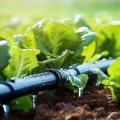Irrigation FAQs
How much yield benefit do we get from irrigation in Mississippi?
Any yield response depends on the management and timeliness of the irrigation. The following table displays accepted yield data for the major irrigated crops in Mississippi.
Accepted Yield Responses By Crop
| Cotton | 180 pounds of lint |
| Corn | 50 to 180 (Average MS Yield is 90 bushels.) |
| Soybeans | 15 bushels. |
| Grain Sorghum | No good data. |
How much water does it take for different irrigation systems?
Furrow--A minimum of 10 GPM per acre.
Flood--(Rice), 15-20 GPM per acre.
Border--A minimum of 10 GPM per acre.
Center Pivots--A minumum of 4.5 GPM per acre to put out a gross of 1 inch in 4 days.
(Many producers are upsizing to put out an inch in 3 days or 6.25 GPM per acre).
Towable Privots and Traveling Guns--A minumum of 5 GPM per acre total to by irrigated.
Irrigation, Soil and Water Home
How many acres of Mississippi crops are irrigated?
(This will vary from year to year)
| Cotton | 300,000 acres |
| Soybeans | 350,000 acres |
| Corn | 200,000 acres |
| Rice | 250,000 acres |
| Other Crops | 100,000 acres |
When do you start to irrigate?
When you feel like an inch of rain would do some good and when soil moisture in the root profile reaches 50 percent depletion.
The critical stages for the different crops are:
| Cotton | Beginning bloom |
| Corn | Eight leaf stage and very critical at tassel and silk |
| Soybeans | Beginning bloom |
| Grain Sorghum | Boot stage |
Publications
News
Water management specialists with Mississippi State University have extensive advice for those implementing different irrigation techniques, but they all agree that using soil moisture sensors is the best way to irrigate.
If there’s one thing that’s important in gardening, it’s proper watering. Vegetable gardens need about 1 inch of water each week.
Success Stories
Brian Andrus irrigated exactly zero times on his Sunflower County farm in 2021. He didn’t even turn on his well.
Delta soybean producer irrigates his fields, increases yields
Most of the Delta is already irrigated, but not all farmers are taking advantage of the latest irrigation technologies. However, agents with the Mississippi State University Extension Service are increasing Delta producers’ knowledge— and application—of new, more efficient ways to water the rows.
Delta farmer Travis Satterfield reflects on 40+ years in the fields
The price of rice hasn’t increased much since Travis Satterfield of Benoit began growing it in 1974, but nearly everything else in the world of production agriculture has changed.








